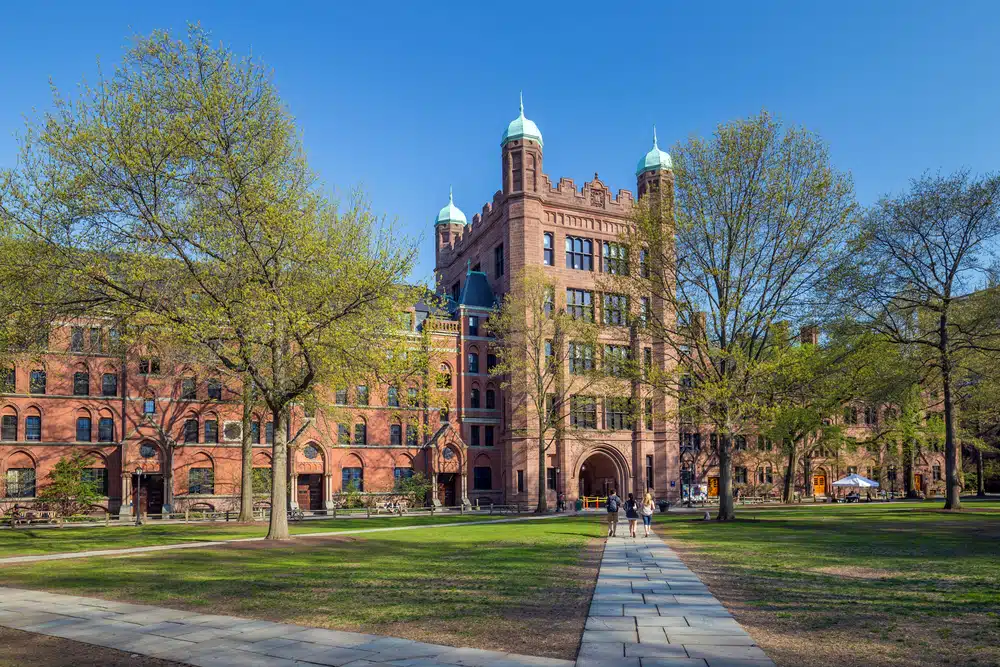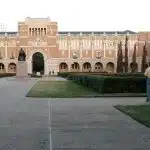The University of Michigan (UMich) asks for two supplemental essays, alongside the Common App personal statement. The school has a competitive admissions process with an acceptance rate of 15.6%—and you can be part of the next admitted batch of students with the help of well-written essays.
Today, we’ll be tackling each of the UMich supplemental essay prompts and offer tips and examples to help you write your own responses.
- UMich Supplemental Essay Prompts
- How to Write the UMich Supplemental Essay #1
- How to Write the UMich Supplemental Essay #2
- Mistakes to Avoid When Writing UMich Supplemental Essays
- Frequently Asked Questions
- Takeaways
UMich Essay Prompts
The University of Michigan requires applicants to submit the Common App personal statement and two supplemental essays. Here are the prompts for 2024-2025:
- Everyone belongs to many different communities and/or groups defined by (among other things) shared geography, religion, ethnicity, income, cuisine, interest, race, ideology, or intellectual heritage. Choose one of the communities to which you belong, and describe that community and your place within it. (100 to 300 words)
- Describe the unique qualities that attract you to the specific undergraduate College or School (including preferred admission and dual degree programs) to which you are applying at the University of Michigan. How would that curriculum support your interests? (100 to 550 words)
You may only have two supplemental essays to write for UMich, but don’t be complacent. You still need some time to reflect on your answers and structure your responses well. We’ll go through all the prompts below.
How to Write the UMich Supplemental Essay #1
| Prompt: Everyone belongs to many different communities and/or groups defined by (among other things) shared geography, religion, ethnicity, income, cuisine, interest, race, ideology, or intellectual heritage. Choose one of the communities to which you belong, and describe that community and your place within it. |
| Word count: 100 to 300 words |
For this UMich supplemental essay, you should talk about one community (whether based on geography, ethnicity, interest, or others) that you’re a part of and explain what makes that community unique and your personal role within it. This prompt aims to understand several things about you:
- How do you perceive yourself in relation to others?
- What communities are meaningful to you, and why?
- How do you interact with and contribute to a group?
- Can you communicate your experiences and insights clearly?
Brainstorming ideas
To help you choose what community to write about, here are some brainstorming ideas to start with:
1. List your communities.
Start by listing all the groups you belong to. And we mean everything you belong to, from your family to online gaming communities. For each community, think of big moments that really show your connection to it.
2. Think of your role.
For each community, think about your role. Are you the president of your school’s French club? Are you a substitute in your basketball team? Are you a mentor to your younger siblings? Regardless of whether you’re a leader, participant, or observer, how do you contribute?
3. Reflect on the impact.
Has your involvement in this community led to personal growth or a change in perspective? Which community has had the most significant impact on you? Which one reveals the most about your character?
Essay structure tips
Once you’ve chosen a certain experience with a community, here’s a step-by-step on how you can write it:
1. Introduce the community.
Clearly identify the community you’ve chosen. You can give a short overview of what defines this community. Let’s say you’re part of your school’s debate club. You can open your essay with something like this:
- “My community is the dimly lit room of the high school’s debate club, a space where arguments aren’t conflicts but collaborative puzzles. We’re a crew made up of the fast-talkers, the meticulous researchers, and those, like me, who find their voice in the structured chaos of a well-crafted rebuttal.”
2. Explain your role.
Explain your specific role within the community. You don’t need to hold a certain title like club president. What were your personal contributions that were valuable to your community?
Going back to the debate club example, you can continue your essay with this:
- “I’m the ‘evidence hound’ of the group, spending hours sifting through journals and news articles to build a solid case. My role isn’t really about winning, but it’s about making sure our arguments are grounded in fact.”
3. Focus on a specific experience.
Share a personal experience that shows how you move in your role. For example:
- “During a debate about climate change, I spent weeks researching scientific studies to help provide my team with data that shifted the perspective of our opponents.”
4. Summarize your insights.
Summarize how being part of this community has influenced your personal development and how it also positively affects your future. For example:
- “It’s in these moments, when a complex issue becomes clear through our collective effort, that I feel most connected. This community has taught me the power of rigorous inquiry and the importance of listening—not just to respond, but to really understand. It’s a place where differences are valued and the pursuit of truth unites us.”
This ending works so well because it wraps up with a strong sense of connection and personal growth. It shows how you value open-mindedness and collaboration, leaving the admissions committee with a real appreciation for your community and its impact.
Supplemental essay example
The clatter of tools on metal was the soundtrack of my childhood. My dad’s workshop, which was wedged between the washing machine and a shelf of old paint cans, was my first classroom.
He would hand me parts from engines he was fixing, challenging me to name their functions, like pistons, rotors, and brake calipers. I was too small to lift most of them, but I learned early that understanding how something worked made it feel less intimidating.
When I outgrew the garage, I found a new home in my school’s robotics lab. It smelled like burnt solder and whiteboard markers, and the air buzzed with the quiet hum of students deep in concentration. The lab was a workspace containing a community built on curiosity, patience, and persistence. We were a group of students who sometimes gave up our weekends and stayed long after the final bell because solving problems together felt like building something bigger than ourselves.
Initially, I only stood on the edge of the team’s circle, watching older students code and build mechanisms I didn’t understand yet. But I stayed and asked questions. I messed up a lot: motors smoked, wires fried, code broke, and designs failed. Every failure, though, came with a team huddled around a whiteboard, brainstorming how to fix it together.
Over time, I became the one holding the marker, the one teaching newer members how to wire sensors or balance a chassis. I became a leader who made sure every voice was heard.
At UMich, I hope to continue building these bridges through the Michigan Robotics teams and organizations like Women in Science and Engineering. I dream of engineering solutions that reach beyond the lab—building technologies and communities that empower people to see themselves as users and creators of their own future.
How to Write the UMich Supplemental Essay #2
| Prompt: Describe the unique qualities that attract you to the specific undergraduate College or School (including preferred admission and dual degree programs) to which you are applying at the University of Michigan. How would that curriculum support your interests? |
| Word count: 100 to 550 words |
This University of Michigan supplemental essay is a more specific “Why This College?” prompt. It’s asking you why you’re attracted to a specific undergraduate college at UMich. The specific things that admissions officers will be looking for in your essay are:
- Specific interest. Have you thoroughly researched the college/school you’re applying to? Why LSA, or Engineering, or Ross?
- Academic fit. Do your interests align with the curriculum and opportunities offered?
- Intellectual curiosity. Are you genuinely excited about learning and exploring within your chosen field?
- Future goals. Do you have a sense of how UMich will help you achieve your aspirations?
Brainstorming ideas
To help you pinpoint the things you’re most interested in regarding your undergraduate college or school and how you connect to that, here are some brainstorming ideas:
1. Research the program.
Go beyond the general website and really look into your program and the College or School that houses it. Here are some things you can explore:
- Department websites
- Course catalogs
- Faculty members and their areas of expertise
- Research opportunities and labs
- Student organizations and clubs related to your interests
Look for any unique aspects as well. Are there specific research labs, centers, or institutes that you’re very interested in? Are there study abroad programs, internships, or other experiential learning opportunities? Are there dual-degree programs that might interest you?
2. Do some self-reflection.
Think of your academic interests, career goals, and passions. Remember past experiences (like classes or projects) that sparked these interests and see if UMich has similar experiences to offer you.
Have you explored a subject that challenged you and want to deepen that at UMich? Maybe a research project sparked your interest in STATS 412: Machine Learning, or community service led you to the school’s Ginsberg Center. Finding these connections shows how the institution will help you grow.
3. Make connections.
Find specific courses, extracurricular activities, or initiatives that match your interests and think of why they appeal to you. Consider how the curriculum’s structure or special opportunities will help you grow or achieve your goals.
4. Think of your future goals.
Think about the impact you want to have and how the program can help you with that. What skills and experiences will you gain in the university that will help you grow academically and professionally? What impact do you hope to make in your chosen field?
Essay structure tips
Once you’ve done enough research and reflection, here’s how you can answer the prompt:
1. Capture your interest in your chosen field.
Start with a hook that hints at your chosen field. Then, clearly state which college/school you are applying to. You can give a quick overview as to why it’s a good fit.
Let’s say you’re applying to the College of Literature, Science, and the Arts (LSA) for a major in Earth and Environmental Sciences. You can begin your essay like this:
- “The scent of damp earth after a rainstorm, the detailed patterns on a butterfly’s wings, the sheer power of a surging river—these natural wonders have always held me captive. It’s this deep fascination that compels me to apply to the University of Michigan’s College of Literature, Science, and the Arts, specifically for the Earth and Environmental Sciences program.”
2. Talk about your chosen program.
Discuss the unique qualities of the curriculum that particularly attract you. Explain why these aspects are important to you and how they relate to your main academic passion. Be very specific here since it’s proof that you researched different aspects of your program.
For example:
- “What draws me to LSA is the program’s interdisciplinary approach. Rather than just memorizing ecological concepts, it’s also about understanding the complex interplay between human activity and the natural world. Courses like ‘Ecosystem Ecology’ and ‘Environmental Policy, Politics and Organizations’ can help give me a comprehensive understanding of these interactions.”
3. Connect to other interests.
What other aspects of UMich appeal to you outside of your program? What other interests do you have, and how can the curriculum support that? Don’t be afraid to mention specific courses or projects.
For instance, if you’re going to jump off from the previous example:
- “Beyond the classroom, I’m drawn to the many research opportunities available at the School for Environment and Sustainability. The idea of conducting fieldwork in the Great Lakes region or participating in research projects at the Biological Station is incredibly appealing. I believe that hands-on experience is highly important for developing the skills needed to address urgent environmental challenges. On top of that, the flexibility of LSA’s curriculum can let me explore my interests outside of Environmental Science. I plan to take courses in Geographic Information Systems (GIS) to improve my data analysis skills and possibly minor in a related field like Economics to better understand the economic drivers behind environmental issues.”
4. Reiterate your fit for the program.
Talk about how your education at UMich will help you achieve your future goals. End the essay by reiterating your enthusiasm for joining the institution and how you and the program are a good fit for each other.
It will look something like this:
- “My ultimate goal is to contribute to sustainable environmental management and conservation. I envision myself working in research or policy, developing solutions that balance human needs with ecological preservation. I believe that the rigorous academic environment and diverse opportunities at the University of Michigan will provide me with the foundation necessary to achieve these aspirations. I am eager to join a community of scholars and activists dedicated to making a positive impact on our planet.”
Supplemental essay example
My first “policy” was a petition written in bright blue marker on the back of a lobster trap tag. I was ten and had just learned that our town’s only public library was cutting its hours due to budget shortages. My petition gathered all of sixteen signatures (mostly from my parents’ friends), but I still remember standing in front of the town council, clutching that flimsy sheet like it was the Constitution itself.
I didn’t save the library, but I did discover something I haven’t been able to let go of since: the gap between what matters to people and what makes it into official policy.
That gap continues to drive my intellectual curiosity today. It’s why I spent three summers archiving old shipwreck records at the Edgeport Maritime Museum, why I built a timeline tracing how child labor protests in 1913 shaped Maine’s labor laws, and why I sit on my district’s Policy Review Committee asking questions like, “Who isn’t this serving?”
At Michigan’s College of Literature, Science, and the Arts, I see a place where my curiosity won’t be boxed into a single discipline. I like that LSA encourages students to cross boundaries—like combining History and Political Science with data analysis through the Quantitative Methods in the Social Sciences program.
I can already imagine myself taking courses like HIST 111: The American Past I and HIST 112: The American Past II, building a richer understanding of how historical patterns continue to shape today’s legislative decisions. I can pair those courses with STATS 250: Introduction to Statistics and Data Analysis, to strengthen my ability to interpret data and ask sharper questions about policy impacts. I want to understand what happened in the past and also measure and evaluate how those patterns continue to influence the present.
I’m interested in the Michigan in Washington Program, which can give me the chance to spend a semester applying what I learn in Ann Arbor to real-world policy research in D.C. There, I can learn more about how policies are written, aside from how they affect people’s daily lives. I can already picture myself combing through congressional archives, interviewing community leaders, or contributing to policy briefs on education access or labor rights.
Beyond coursework, I’m inspired by the practical, student-led work coming out of the Program in Practical Policy Engagement. Whether evaluating city-level reforms or working alongside local governments to improve services, UMich students are learning how to move from theory to action. That’s exactly the kind of environment I’ve been looking for—a place where I can sharpen both my academic and civic skills, preparing me to turn research into meaningful change.
Long term, I hope to work in legislative advocacy, helping shape public policies that expand access, whether to education, fair labor protections, or civic participation. I know that understanding history is key to building better laws, and that data alone isn’t enough unless you know how to ask the right questions.
At UMich, I see the chance to develop both the analytical tools and the civic imagination to do that work well. Because after studying how policies are made, I also want to stand in the rooms where they’re written and make sure those decisions are driven by the people they’re meant to serve.
Mistakes to Avoid When Writing UMich Supplemental Essays
Let’s break down the common mistakes in UMich supplemental essays and share some tips to fix them:
1. Being too vague
Simply stating general admiration for UMich without mentioning specific programs, professors, or opportunities shows a lack of research and genuine interest. This also applies to just saying your general aspirations without connecting them to your chosen field of study or the school’s resources.
For instance, simply saying “I want to make a difference in the world” is weak since that’s probably the general idea of so many essays already. Instead, be more specific, like “I want to contribute to sustainable urban planning, and I believe the University of Michigan’s Urban Technology program will provide me with the necessary skills and knowledge.”
2. Focusing on reputation rather than fit
UMich already knows it’s a great school—you can see it in its prestige and rankings. Because of that, simply parroting the school’s accomplishments shows you’re only attracted to the brand, not the specific educational experience.
For example, don’t just say something like “UMichigan is a top-ranked university, and I want to attend the best.” Instead, just say why you choose the school. For example: “The university’s emphasis on interdisciplinary studies will be very helpful in my goal of exploring the intersection of history and economics.”
3. Not reflecting on possible contributions
We understand wanting to make the most of your college experience by looking for ways you can grow. However, focusing your essay only on personal benefits rather than mutual growth sounds one-sided and self-serving.
So, don’t just say “I hope to gain a great education and lots of opportunities at the University of Michigan.” Think of what you can possibly contribute, such as “I am eager to contribute to the university’s innovative community by collaborating on research projects in the Engineering Zone and sharing insights from my experience leading local robotics competitions.” Show that you’re ready to add value to the community, not just take from it.
4. Lacking authenticity and passion
Writing in a robotic or overly formal tone, or trying to sound like what you think admissions officers want to hear will make your essay seem insincere and unengaging. Don’t rely on clichés and buzzwords.
Share your unique experiences and how they connect to the future you look forward to at the University of Michigan. Instead of saying “I’m a hard worker and a team player who loves to think outside the box,” say “Building custom robots for competitions like the RoboFest taught me that every challenge is a chance to innovate—a lesson I look forward to expanding through the university’s project-based courses.”
Pro tip: a college essay expert can help you fine-tune your ideas, make your writing stronger, and ensure your UMich supplemental essays really reflect who you are. They’ll catch things you might’ve missed—like clarity, structure, or missed opportunities to stand out. Sometimes, a fresh set of eyes makes all the difference!
Frequently Asked Questions
1. Does UMich have supplemental essays?
Yes, UMich requires supplemental essays. This is on top of the Common Application personal statement.
2. How many supplemental essays does UMich have?
Unlike other essay-heavy schools, UMich has only two supplemental essays. The first asks about a community you belong to, and the second asks about your chosen program.
3. How important are UMich supplemental essays?
UMich supplemental essays are very important since they offer insight into your personality, interests, and fit with the community. They showcase your unique experiences and explain why the university is an ideal match for your academic and personal goals.
Takeaways
UMich supplemental essays offer important insights beyond your transcript by revealing your personality, specific interests, and how you’d fit into their community.
- UMich requires two supplemental essays and the Common App personal statement.
- Some mistakes to avoid when writing UMich supplemental essays are being too vague, focusing on reputation rather than fit, not reflecting on possible contributions, and lacking authenticity and passion.
- You only have two supplemental essays to boost your application, so it’s important to make them count. A private college consultant can help you craft strong essays and put together the best possible UMich application.



















